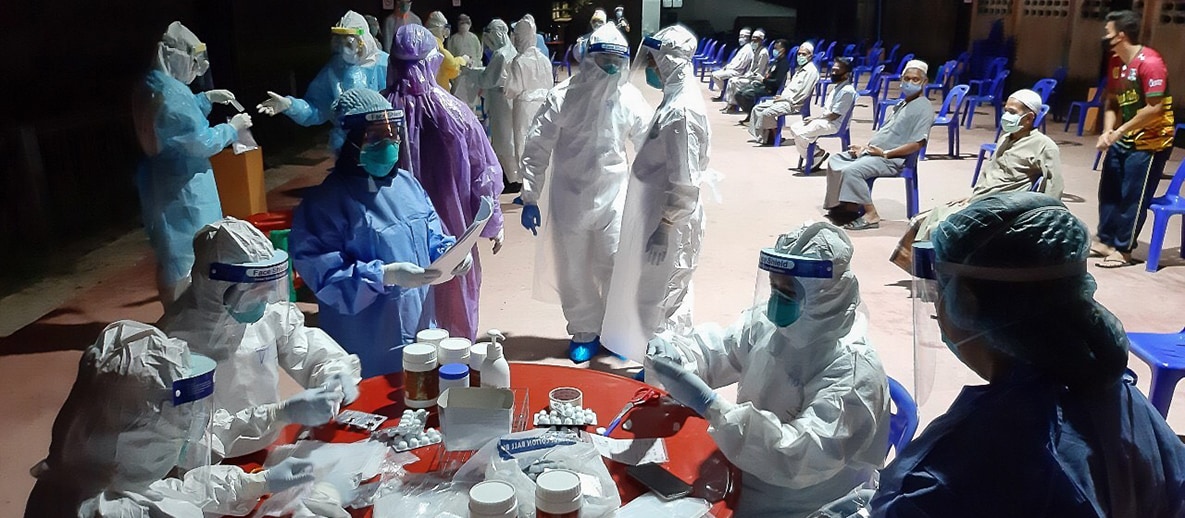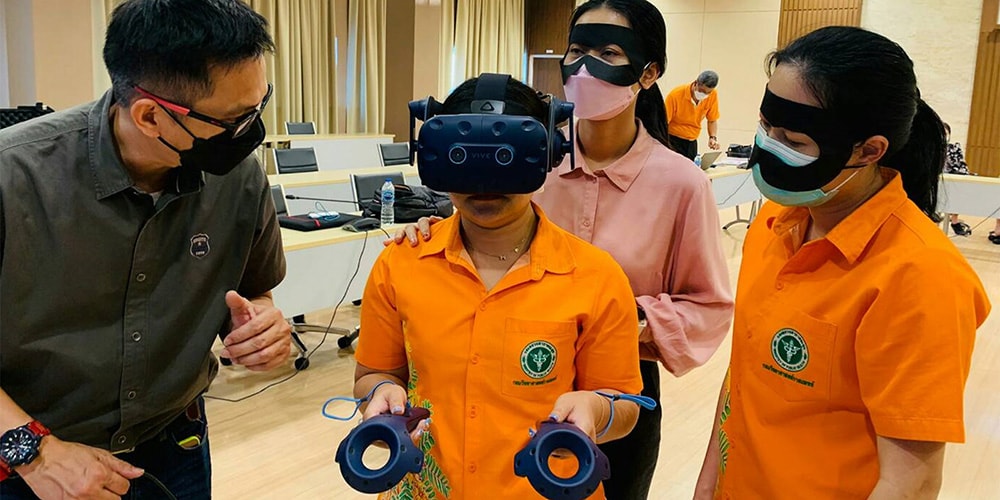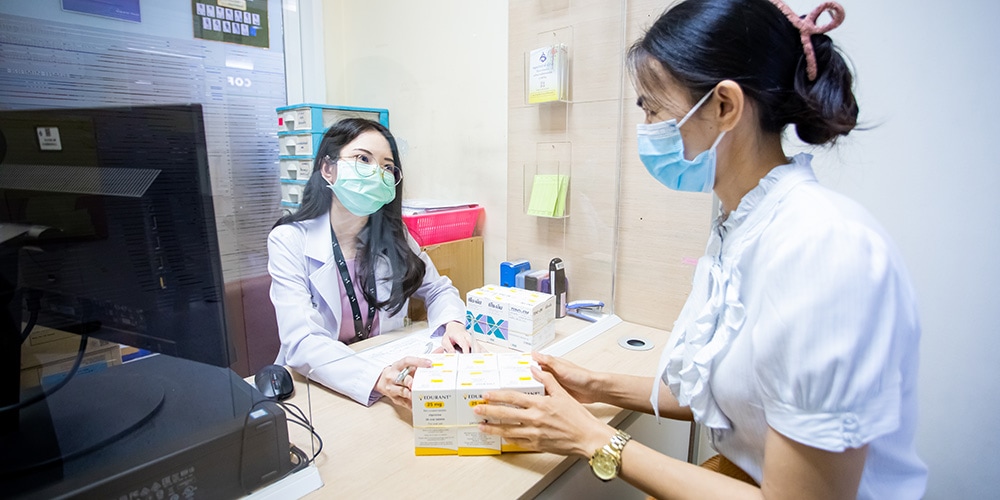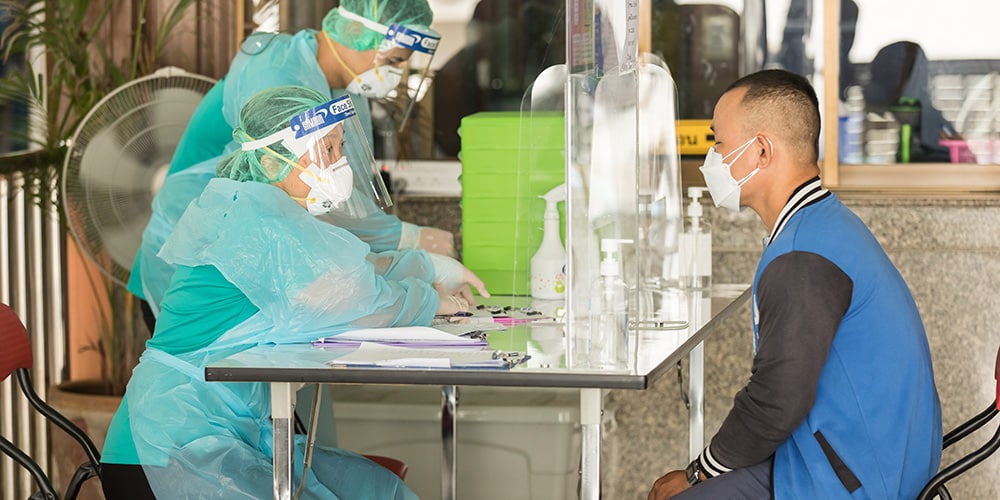CDC in Thailand

Thai epidemiologists conduct case investigations for COVID-19 during the Ramadan fasting period in 2020. For several decades, CDC has partnered with Thailand to build a workforce of expert disease investigators through the Field Epidemiology Training Program. Photo by Thailand Ministry of Public Health
The Centers for Disease Control and Prevention (CDC) has worked with Thailand’s Ministry of Public Health (MOPH) since 1980, when CDC established the first Field Epidemiology Training Program (FETP) outside of North America. CDC and MOPH work together to prevent and control HIV/AIDS, tuberculosis, influenza, and other infectious diseases; combat emerging infectious diseases through preparedness, surveillance, and control; translate local research into practice; improve the health of mobile populations; reduce the risk of cross-border disease transmission; and share important lessons-learned with other countries. The continued COVID-19 response highlights how this partnership is key to pandemic preparedness and response.
Global Health Security
CDC supports Thailand to continue strengthening local capabilities to prevent, detect, and respond to infectious disease outbreaks, achieve the goals outlined in the Global Health Security Agenda (GHSA), and implement the International Health Regulations. Thailand is a member country of GHSA, a permanent member of the GHSA Steering Group, and served as the Chair of the GHSA Steering Group in 2021. CDC supports Thailand in its role as a co-lead of the National Laboratory Systems and Workforce Development Action Packages and participant in the Antimicrobial Resistance and Biosecurity Action Packages.
Thailand’s National Strategic Plan on Antimicrobial Resistance (AR) for 2017-2021 aimed to reduce AR-related morbidity by 50%. The CDC office in Thailand provided technical assistance to assess and strengthen the capacity of health facilities in Bangkok to detect and respond to AR, establish and strengthen national and sub-national AR laboratory networks, build capacity to identify novel mechanisms of resistance, and provide specimens to WHO’s supported Enhanced Gonorrhea Antimicrobial Surveillance Programme.

When in-person trainings were suspended due to COVID-19, CDC developed Virtual Reality (VR) Biosafety Cabinet training modules and tested them in Thailand. Photo credit: Ratigorn Guntapong/MOPH
CDC helps strengthen Thailand’s Emergency Operations Center (EOC) and set up rapid response teams for the COVID-19 response
With CDC support, Thailand completed Joint External Evaluations in 2017 and 2022, a National Action Plan for Health Security in 2019, and chaired the GHSA Steering Committee in 2021
Field Epidemiology Training Program (FETP)
Through Thailand’s FETPs, CDC helps strengthen workforce abilities to investigate and respond to disease outbreaks. CDC established the FETP in Thailand in 1980 to train the next generation of public health leaders in Thailand and the region. Thailand’s FETP participants gain the skills to collect, analyze, and interpret data and contribute to evidence-based decisions during outbreak responses. In 2020, CDC and the Thai FETP established the FETP-Emerging Infectious Diseases (FETP-EID) track, in which residents work alongside CDC staff for 10 months to gain experience in emerging infectious diseases. During their time with CDC, FETP-EID residents receive on-the-job training in laboratory methods, epidemiologic data analysis, and research related to emerging and re-emerging infectious diseases. Thai FETP graduates are integral staff at Thailand’s EOC and play a particularly important role since the onset of the COVID-19 pandemic.
Since 1980, more than 228 epidemiologists, including 56 trainees from other countries, graduated from the Thai FETP
HIV
Thailand is on track to control the HIV epidemic by 2025. As of 2022, an estimated 94% of people with HIV know their status, 91% of people diagnosed with HIV are on treatment, and 97% of people with HIV who are on treatment achieved viral load suppression. As a key implementer of the U.S. President’s Emergency Plan for AIDS Relief (PEPFAR), CDC focuses on 14 provinces in Thailand with high rates of HIV. CDC helps strengthen disease surveillance systems, laboratory capacity, case-finding strategies, and safe delivery of medicine during the COVID-19 pandemic. CDC also helps implement HIV pre-exposure prophylaxis (PrEP), adult HIV care and treatment, programs to reduce stigma and discrimination, and continuous quality improvement along the HIV continuum of care. CDC conducts and supports research on injectable long-acting PrEP and new prevention and treatment strategies like non-daily PrEP and antibiotics for sexually transmitted infections.
The PEPFAR Asia Region Program (ARP) includes a diverse group of 12 countries: Burma (Myanmar), Cambodia, India, Indonesia, Kazakhstan, Kyrgyzstan, Laos, Nepal, Papua New Guinea, the Philippines, Tajikistan, and Thailand. ARP launched in 2019 with a vision to bring countries together to increase regional impact and efficiencies to advance and sustain epidemic control. The PEPFAR regional coordination unit is based in Bangkok, Thailand, and serves as the regional advisors for planning, budgeting, program implementation, results monitoring, and reporting.

CDC Thailand supports the delivery of medicine and telehealth services provided at Ramathibodi Hospital to people living with HIV during the COVID-19 pandemic. Photo by CDC
97% of people with HIV in Thailand achieved undetectable viral loads, meaning they cannot transmit HIV to sexual partners. This percentage is near the top of all PEPFAR countries
In 2013, Thailand and CDC conducted the world’s first clinical trial that showed that PrEP can reduce HIV spread among people who inject drugs
In 2021, CDC and research partners in Thailand and other countries completed a landmark trial of a new PrEP drug among men and transgender women who have sex with men. The trial demonstrated that this injectable and long-acting drug is safe and effective, providing evidence that the U.S. Food and Drug Administration, CDC, and others used to issue new treatment recommendations and policies
In 2016, with support from CDC, Thailand was the first Asian country to receive World Health Organization certification for the elimination of mother-to-child transmission of HIV and syphilis
COVID-19
CDC works with partners in Thailand to respond to COVID-19 by integrating COVID-19 surveillance into the influenza sentinel surveillance system and leading contact tracing, mitigation, and control efforts in Bangkok. To monitor disease spread, CDC also supports serosurveillance (testing blood for diseases) among healthcare workers, refugee camps along the Thai-Myanmar border, and the general public. CDC strengthens border health activities by coordinating with neighbor countries, assessing points-of-entry, and sharing information on population movements. CDC also helped develop a national electronic COVID-19 vaccine registry and certificate system that is used to verify vaccination status for international travel.

CDC staff interview a patient for enrollment in a study on COVID-19 fever. This project seeks to detect and monitor SARS-CoV-2 (virus that causes COVID-19) infection among patients presenting to hospitals with unexplained fever in Nakhon Phanom and Tak provinces. Photo by CDC
Since 2020, CDC supported 15 training courses for laboratory scientists in Thailand, Vietnam, Cambodia, Indonesia, Laos, and the Philippines, including courses on biosafety, advanced molecular methods, bioinformatics, and laboratory management
Between 2020 and 2023, CDC’s laboratory in Thailand performed more than 10,000 COVID-19 diagnostic tests in support of Thai government partners, the International Rescue Committee, and the U.S. Embassy community
CDC developed an enhanced disease surveillance program that is active in 9 refugee camps on the Thai-Myanmar border. This has system detected 3 COVID-19 outbreaks and helped mitigate widespread epidemics
CDC and partners published findings on clinical management of COVID-19 patients, which led to changes in the national discharge criteria
CDC worked with the MOPH to develop of an electronic COVID-19 vaccine registry for international travel. This system produces a COVID-19 vaccine certificate that is accessible via a smartphone application (MorPhrom) and has QR codes that are compatible with Singapore and European Union systems
Between July 2021 and June 2022, the electronic COVID-19 vaccine registry system generated more than 250,000 electronic certificates on the MorPhrom app
Influenza
CDC supports countries to develop effective seasonal influenza vaccination programs with robust regulatory and delivery systems. These efforts increase local, regional, and global pandemic preparedness. CDC provides support and coordination across Thailand, as well as in Bangladesh, Indonesia, Laos, and to the WHO. CDC’s primary objectives include:
- Providing epidemiology and laboratory technical support to influenza detection, response, and prevention activities in Southeast Asia
- Growing the evidence-base to inform policy decisions for prevention and control programs, including influenza vaccination
- Supporting pandemic preparedness and the ongoing COVID-19 pandemic response in partner countries
CDC supports Thailand to sustain sentinel and event-based surveillance to monitor circulating influenza and respiratory pathogens. Due to these efforts, the Thailand National Influenza Center is regarded as a regional leader in surveillance
CDC worked with Thailand’s MOPH to deliver emergency supplies of oseltamivir, an influenza antiviral drug, to Laos within 24 hours. These supplies aided the response to a devastating outbreak of seasonal influenza in 2019
Immigrant, Refugee, and Migrant Health
CDC’s global migration and quarantine experts address public health threats before they cross international borders and prevent the spread of disease among international travelers, immigrants, refugees, and other mobile populations in Southeast Asia. CDC provides technical support to the Thai MOPH and the Lao MOH related to COVID-19 testing and vaccination, disease surveillance, and emergency response and disease prevention at border crossings. CDC supports disease surveillance and outbreak response in refugee camps along the Thai-Myanmar border and ensures that refugees receive vital treatments and vaccinations for healthy resettlement. CDC experts also ensure that health examinations for immigrants and refugees follow CDC standards for detection and prevention of tuberculosis and COVID-19.
CDC provided technical and financial support to the MOPH for their first-ever WHO course on Ship Sanitation Inspection and Issuance of Ship Sanitation Certificates. This course is the first step in the MOPH’s plan to offer international sanitation inspections for ships at marine ports
CDC developed the regional border health initiative with the International Organization for Migration and provided training for immigration officials, international points-of-entry assessments, and monitoring population mobility along the Thai-Laos and Thai-Cambodia borders
CDC supported tracking of vaccine coverage, vaccination records management and certification systems, and other projects to increase demand for COVID-19 vaccines among refugees and migrant workers throughout Thailand
CDC helped recruit and train migrant volunteers in Bangkok and Phuket on COVID-19 detection and prevention
Noncommunicable Diseases (NCDs)
CDC recently worked with Thai partners to implement WHO’s Global Hearts Initiative, which strives to reduce the impact of high blood pressure and heart disease. CDC helps increase the MOPH’s cardiovascular health epidemiology and research capacities. CDC has also supported Thai FETP-NCD residents and staff to conduct a series of situational analyses and research projects focused on cardiovascular health.
CDC supported the Thai FETP with an evaluation of the cardiovascular surveillance system in Saraburi province
CDC partnered with the Thai National Cancer Institute to include new screening methods for colorectal and cervical cancer in the national cancer screening program
Thailand Screens Travelers for COVID-19 at Borders | CDC
Thailand and CDC strengthen laboratory capacity to respond to COVID-19 | CDC
Hunting for COVID-19 Answers in Thailand’s Wastewater | CDC
CDC’s Global Response to COVID-19 | CDC
International network explores the economics of noncommunicable diseases | CDC
- 16 U.S. Assignees
- 141 Locally Employed
- Population: >66.8 million
- Per capita income: >$18,530
- Life expectancy at birth: F 81/M 74 years
- Infant mortality rate: 6/1,000 live births
Sources: Population Reference Bureau 2022, Thailand
- Ischemic heart disease
- Stroke
- Lower respiratory infections
- Chronic kidney disease
- Liver cancer
- Tracheal, bronchus, and lung cancer
- Alzheimer’s disease and other dementias
- Cirrhosis and other chronic liver diseases
- Diabetes mellitus
- Road injuries
Source: GBD Compare 2019, Thailand
Global HIV & TB Thailand country profile
U.S. Embassy and Consulate in Thailand
Publications: Thailand Articles All Issues | Emerging Infectious Diseases journal
Social media: U.S. Embassy Bangkok – Posts | Facebook
Photos: Thailand – CDC Global Flickr
Videos:
- COVID-19 Surveillance Project
- Migrants and Refugee Camps
- People living with HIV in Thailand
- CDC Thailand Overview
- CDC Thailand HIV STD Clinic & Research
- CDC Thailand Global Health Protection
- CDC Thailand HIV STD Laboratory Research
- Thailand Elimination of Mother-to-Child Transmission (HIV/AIDS)
- CDC Thailand Division of Global HIV & TB
- Workforce Development
- Leader in One Health
- The First FETP outside of the North America